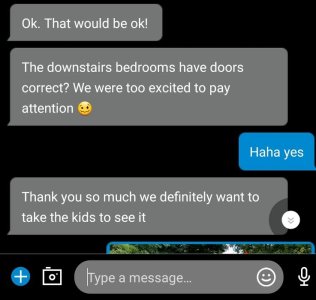Dominus
JUB Addict
- Joined
- Dec 9, 2017
- Posts
- 5,540
- Reaction score
- 599
- Points
- 113
If you don't know what moral hazard is, read this.
https://en.wikipedia.org/wiki/Moral_hazard
Many people, including me, blame moral hazard as playing a big part in causing the financial meltdown of 2008.
I recently accidentally stumbled into this without knowing it.
A couple months back, I rented a house to a young lesbian couple. The rent rate was based on fair market value. I have an agent that does the research for me. I then compare her results with mine and base my rental rates from that.
Earlier this month, about a week after they paid July's rent, they approached me and asked for early termination. That's only 2 months into the lease. Why? They broke up. I wasn't happy but said ok I'll try to find new tenants ASAP so as not to have to charge them for August.
I listed the place a week ago at 25% more and also increased the security deposit by a couple hundred dollars. I thought I'd try out to see if I could rent it out for that much more than what was considered the rental market. If I got no bite in a week, I would just lower it back down since we still got a lot of time left in July.
I've gotten almost a dozen showings and 5 applications. I just deactivated the listing after just 1 week. I have also chosen new tenants. A nice family (yes, they're married) with kids. Both parents are federal workers, aka job security. Signing the lease tomorrow. They got both the security deposit and first month's rent ready.
A couple things came to mind. So, the prospective tenants I was showing the place to all said that there is nothing out there right now. There was a housing shortage in the rental market around here before. It looks like the shutdown and shelter-in-place orders have made the housing shortage even worse. Also, everybody seems to be thinking that the housing market will crash within the next 6-8 months. This will make things even worse.
Was talking to someone this morning about this experience. And he pointed out that without knowing it, I participated in what is known as a moral hazard. See, since the risk of another month's rent wasn't on my shoulder, I was emboldened to try to see if I could increase the rent by that much. Even though in the end it worked out for everybody, the fact remains that given the opportunity, anyone would take the risk if they weren't responsible for paying for the risk if things went south.
We often blame wall street speculators for the financial meltdown because those guys took way too many unnecessary risks at the expense of the investors and the overall economy. My recent experience has actually changed my perspective on this. Can we really blame people for this phenomenon (moral hazard). Given the opportunity, anyone would take that risk because the consequences of the risk wasn't on their shoulders.
Do you agree with this perspective?
https://en.wikipedia.org/wiki/Moral_hazard
In economics, moral hazard occurs when an entity has an incentive to increase its exposure to risk because it does not bear the full costs of that risk. For example, when a corporation is insured, it may take on higher risk knowing that its insurance will pay the associated costs. A moral hazard may occur where the actions of the risk-taking party change to the detriment of the cost-bearing party after a financial transaction has taken place.
Many people, including me, blame moral hazard as playing a big part in causing the financial meltdown of 2008.
I recently accidentally stumbled into this without knowing it.
A couple months back, I rented a house to a young lesbian couple. The rent rate was based on fair market value. I have an agent that does the research for me. I then compare her results with mine and base my rental rates from that.
Earlier this month, about a week after they paid July's rent, they approached me and asked for early termination. That's only 2 months into the lease. Why? They broke up. I wasn't happy but said ok I'll try to find new tenants ASAP so as not to have to charge them for August.
I listed the place a week ago at 25% more and also increased the security deposit by a couple hundred dollars. I thought I'd try out to see if I could rent it out for that much more than what was considered the rental market. If I got no bite in a week, I would just lower it back down since we still got a lot of time left in July.
I've gotten almost a dozen showings and 5 applications. I just deactivated the listing after just 1 week. I have also chosen new tenants. A nice family (yes, they're married) with kids. Both parents are federal workers, aka job security. Signing the lease tomorrow. They got both the security deposit and first month's rent ready.
A couple things came to mind. So, the prospective tenants I was showing the place to all said that there is nothing out there right now. There was a housing shortage in the rental market around here before. It looks like the shutdown and shelter-in-place orders have made the housing shortage even worse. Also, everybody seems to be thinking that the housing market will crash within the next 6-8 months. This will make things even worse.
Was talking to someone this morning about this experience. And he pointed out that without knowing it, I participated in what is known as a moral hazard. See, since the risk of another month's rent wasn't on my shoulder, I was emboldened to try to see if I could increase the rent by that much. Even though in the end it worked out for everybody, the fact remains that given the opportunity, anyone would take the risk if they weren't responsible for paying for the risk if things went south.
We often blame wall street speculators for the financial meltdown because those guys took way too many unnecessary risks at the expense of the investors and the overall economy. My recent experience has actually changed my perspective on this. Can we really blame people for this phenomenon (moral hazard). Given the opportunity, anyone would take that risk because the consequences of the risk wasn't on their shoulders.
Do you agree with this perspective?





